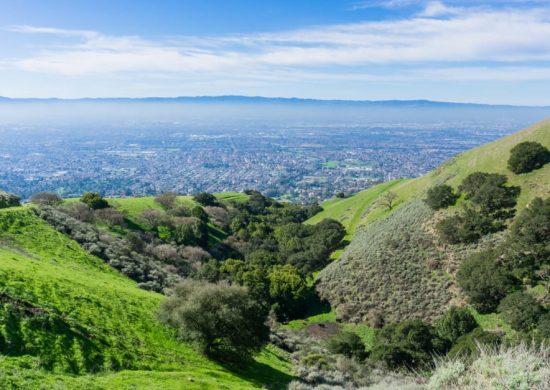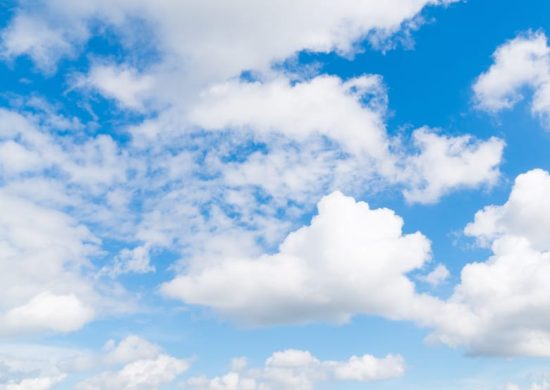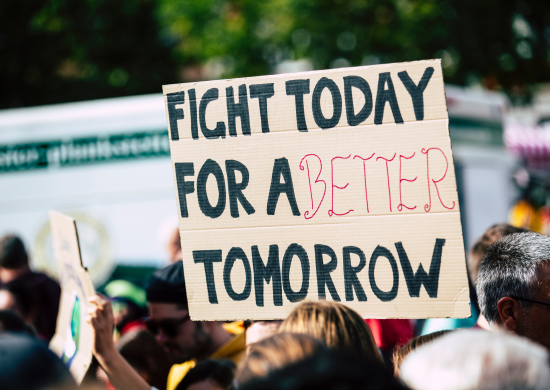There are many ways to have a meaningful experience outdoors. Try to be outside frequently and have a combination of solitary and social experiences outdoors.
Note: Although there is inequitable access to green/blue space, open space, and parks—as well as inaccurate, inequitable representation of outdoor activities, the research discussed in this piece does not analyze those issues. To grow your knowledge on the need for more equitable and inclusive access to the outdoors and find ways to engage, visit our partners Latino Outdoors and Outdoor Afro, read this research digest, or start on an action plan.
—
Growing up in west Michigan, one of my favorite things to do in the summer was go to the lake. We’d spend all day digging holes in the sand, swimming in the waves, chasing away seagulls trying to steal our food, and climbing up (and running back down) the sand dunes. I can still smell the charcoal coals doused in lighter fluid, charred kielbasa and franks, and sweet Coppertone sunscreen. Each of these days would end with a s’more and a mesmerizing Lake Michigan sunset.
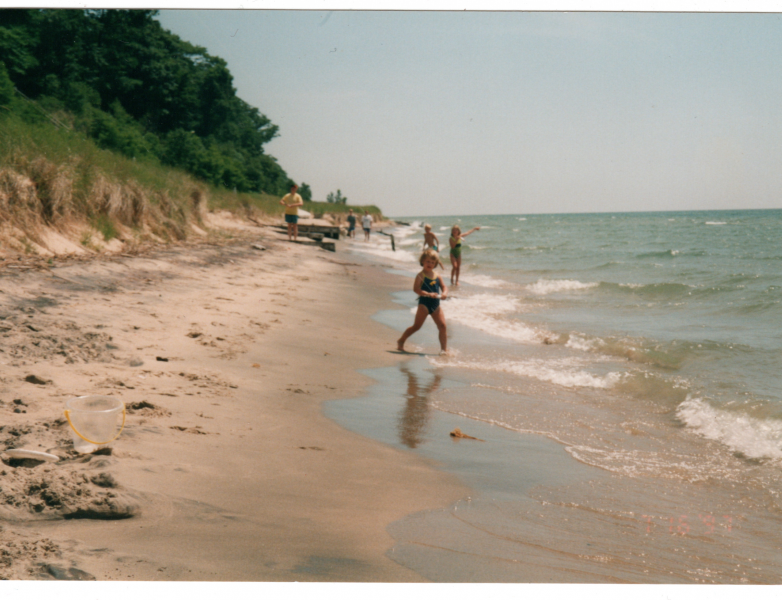 [Caption: Rachel spent many weekends outdoors at Lake Michigan during childhood.]
[Caption: Rachel spent many weekends outdoors at Lake Michigan during childhood.]
I have never described my family as “outdoorsy.” Hiking? No. Camping? Laughable. Week-long trip to a national park? Forget about it. My family was not outdoorsy.
And, yet, looking back, I can see that I would spend entire days—week after week—outside at the beach. We would picnic in parks every Fourth of July. My mom went (and still goes) on walks every day. On the weekends, my siblings and I, often with a couple cousins in tow, went to nearby parks and playgrounds.
We would do this all the time. We were outside but not “outdoorsy.”
This duality is not uncommon. I’d argue that most people spend far more time in nature, particularly more meaningful and memorable time, than they realize. If you think back on your last week, how often were you outdoors? Maybe you went for a walk, mowed the lawn, or sat on a patio. If we intentionally recognize these moments outside, we can understand that they are beneficial, and they add up.
There are many ways to experience and be outdoors. The type of outdoor activities we engage in vary by many factors from culture to geography to the weather. While certain outdoor activities tend to get exalted above others (rock climbing, I’m looking at you), most people do not—and will not—engage in them. Yet, this creates a perception that only people who engage in those activities are the “real” outdoors people with the knowledge of and the benefits from nature.
This is simply not the case.
Most outdoor experiences are beneficial. Even outdoor-adjacent activities like looking out a window at what’s outside can reduce stress and increase our health and well-being. Turns out, there isn’t one specific outdoor activity that is the “best” for creating a strong bond with nature. It doesn’t matter what outdoor activity you engage in. The most important part is that people have a variety of experiences outside—both solitary experiences and experiences spent with others. Dr. Kathryn Stevenson, Dr. Nils Peterson, Dr. Howard Bondell, and I conducted a study to figure this out. We surveyed 1,285 young people ages nine-to-twelve on their outdoor activities: what did they do outside, and how often did they do it? We then compared these data to how comfortable they are outside and how much they like and care for the outdoors to see what outdoor activities predicted a strong bond with nature. Our analysis revealed that young people who participated in both social and solitary activities outside had the strongest bonds with nature.
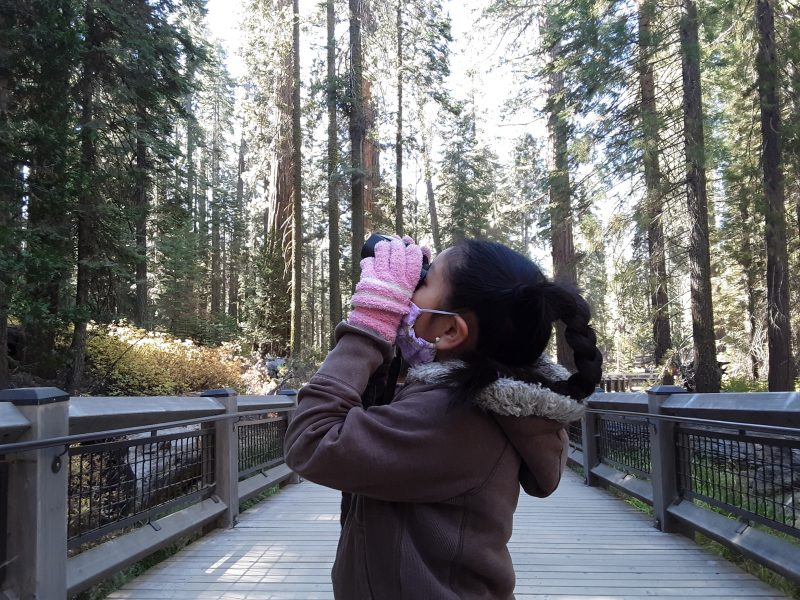 [Caption: A child has a solitary experience outside while on a family-friendly outing at Yosemite National Park. Photo Credit: Ruby Rodríguez, Latino Outdoors staff]
[Caption: A child has a solitary experience outside while on a family-friendly outing at Yosemite National Park. Photo Credit: Ruby Rodríguez, Latino Outdoors staff]
Solitary outdoor experiences can be many different things, especially in childhood and adolescence. But we’re not talking about total isolation like what is depicted on the reality TV show Alone where contestants survive as long as they can in the wilderness without other humans. Rather, solitary outdoor experiences can be thought of as activities that require a deeper connection to nature than to people. For instance, we found that young people who spent time hunting and fishing were very likely to have a strong bond with nature.
People that hunt, fish, gather, and farm have incredible connections to nature, largely developed through long periods of focused time outdoors. While community is an important part of these activities, deep interaction with, attention to, and—often—love for nature is inherent in them. It makes sense that young people who have nature-focused interactions more often are more connected to nature. Even though we strengthen our bond with nature through mainstream solitary, outdoorsy experiences like camping and hiking, we also strengthen our bond through less-thought-of nature-focused activities like gardening, hunting, gathering, farming, fishing, and even beekeeping.
Common social experiences outside build young people’s bond with nature, too. Activities like playing sports outside or spending time with family in the outdoors helped the young people in our study create the strongest bonds with nature. Interacting outside with people (particularly with people you care about) is essential for developing your bond to the outdoors and especially for building up your comfort outside.
This idea of playing sports outside as a key part of growing a young person’s relationship with nature may seem strange. How often do we think of baseball or soccer as “meaningful outdoor experiences” akin to bird watching or camping? Probably never. This thought process is reasonable—these activities may not be about bonding with nature or even about being outside. At least, not primarily. They are about people first and foremost—which is why our study calls these social outdoor activities. However, even though backpacking and basketball are very different social outdoor activities, we found that they are both necessary for helping young people gain the benefits from time outside.
From having a picnic in the park to throwing a ball with a friend, the outdoors is a part of how we live, work, and play with other people. Although these familiar outdoor activities are often depicted as not being “real” outdoor experiences—perhaps because they lack the deep interaction with nature that an activity like rock climbing brings—our research says otherwise. Our lives say otherwise, particularly our lives during the pandemic. These are real outdoor experiences.
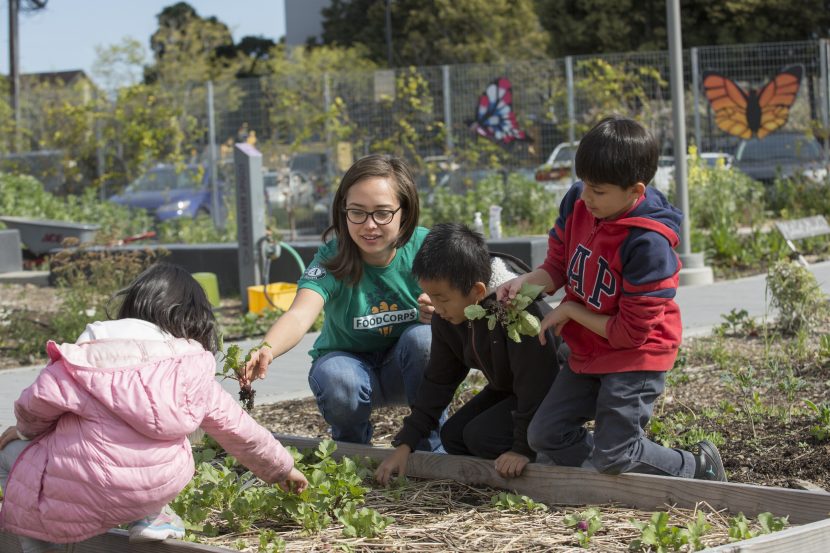 [Caption: Social time outdoors can happen at school, like when students work in the school garden. Photo Credit: Food Corps]
[Caption: Social time outdoors can happen at school, like when students work in the school garden. Photo Credit: Food Corps]
Reflecting on my childhood, I now see how important my experiences outside were. Those times at the beach were full of rich interactions with nature. I was becoming confident in myself in an outdoor setting and learning a ton about nature. I could swim well, identify a rip current, avoid the razor-sharp dune grass and prickly pine needles, and leave no trace at our beach site (even, if only, to avoid the divebombing seagulls). I had the space to play and explore alone and the ability to engage with my siblings or friends.
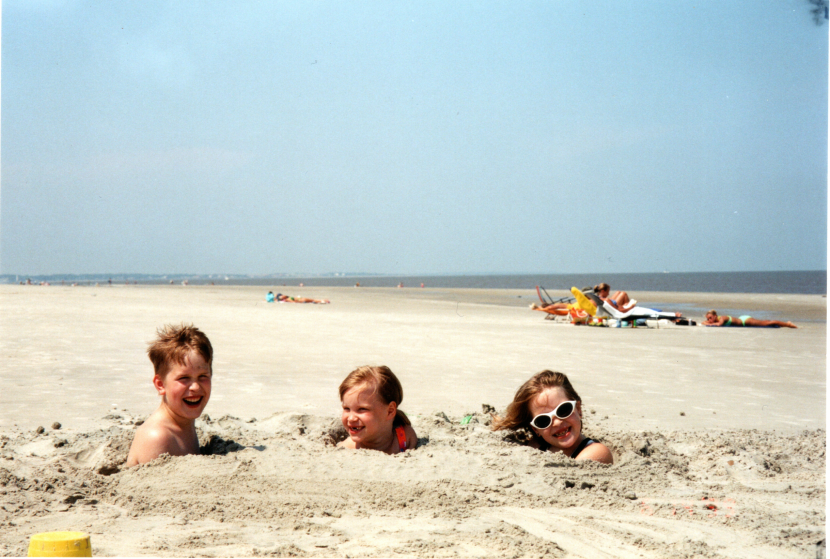 [Caption: Rachel and her two siblings spent valuable time together at the beach.]
[Caption: Rachel and her two siblings spent valuable time together at the beach.]
To be comfortable outside—and to care about nature enough to sustain and restore it—we need to have frequent meaningful outdoor experiences, like my days spent in the sand.
As you seek to gain the benefits of time outside, embrace the diversity of outdoor experiences. Feel empowered. Recreate responsibly. Make memories by yourself and with others.
You can find the outdoor experience that works for you, your family, your community, and your schedule. The picnic last Saturday and daytime program at the park add up. We just need to recognize these as valid, powerful outdoor experiences. Rather than overlooking these experiences because they are seemingly commonplace or different than the mainstream version of outdoor time, let’s celebrate them. Three cheers for the hunters, beachgoers, and soccer players—you are building a bond that is needed now more than ever. You are outside, perhaps even outdoorsy.

